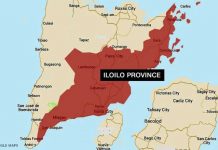MANILA – A calamity fund of P2 billion will be used to help workers that would be displaced by Boracay Island’s six-month closure starting April 26.
No resort owners, however, would benefit from the fund, said Presidential Spokesperson Harry Roque.
There are some 500 tourism-related businesses in Boracay. The Boracay Foundation, a business industry association on the island, had asked the government to shut down only those violating environmental laws.
“Pero hindi naman lahat ng workers madi-displace. Bakit? Ang daming trabahong kailangang gawin doon sa Boracay, so hindi naman sila kinakailangan umalis lahat,” said Roque.
The six-month closure will give way to the rehabilitation of the world-famous island resort.
Over the years, runaway development, the influx of people beyond the island’s carrying capacity, poor implementation of environmental regulations, and encroachment of structures have taken a toll on the 1,032-hectare island.
Data from the Boracay Foundation show there are over 19,000 people working in the formal sector – including hotels, resorts, restaurants, dive shops, souvenir shops, tour activity centers, and transport providers.
Another 17,000 work in the informal sector as masseurs, tattoo artists, and vendors by the beach.
“Siguro maiiba ang trabaho nila, pero magkakaroon pa rin sila ng trabaho sa dami ng dapat gawin sa Boracay,” said Roque.
An interagency composed of the Department of Environment and Natural Resources, Department of Tourism and Department of the Interior and Local Government is leading Boracay’s rehabilitation.
President Rodrigo Duterte approved the interagency’s recommendation for a six-month closure during a Cabinet meeting on Wednesday night.
‘UNFAIR’
The decision raises questions about the livelihoods of thousands employed as part of a bustling tourist trade that serves some two million guests on the island each year.
“We are not against rehabilitation, but there’s no need to shut down the entire island and let the local economy suffer,” said Dr. Henry Chusuey, Boracay Foundation chairman.
Boracay’s tourism-related businesses had a combined annual revenue of P56 billion last year.
“Instead, crack down and close the violators. If you get rid of them, you’re already solving 90 percent of the problem,” said Chusuey, also the chairman of the Henann Group of Resorts.
Even before the ban was announced, its shadow already hit some businesses hard in Boracay, lamented Boracay Foundation executive director Pia Miraflores.
“It’s unfair for compliant establishments to be affected by the closure,” she said.
Tour guides complain they have no more guests, Miraflores revealed.
“There’s already a huge effect,” she said, noting the quays and jetties were “less crowded” than before.
Some couples who scheduled their weddings on the island up to a year or two in advance had cancelled their reservations even before the ban was announced, said Miraflores, with tour agents also besieged with client calls on whether to pursue their planned trips.
The Environment department has found at least 842 establishments violating environmental laws on the world-famous island.
But “it’s not fair that violators and compliant hotels will be treated the same way,” said Chusuey.
“The compliant establishments should be rewarded and the violators should be penalized,” he said.
In a statement, the Environment department said it has issued around 170 show-cause orders to establishments occupying protected forestland, giving them 15 days to explain why they should not be shut down.
It also said 300 other establishments committed violations, mostly of the Clean Water Act, or had failed to connect to the proper sewage facilities.
The municipality of Malay, which has jurisdiction over Boracay, has approved at least 52 ordinances to protect the environment. One key measure, Municipal Ordinance No. 188passed in 2003, calls for mandatory connection to the sewerage system of all commercial establishments within 61 meters of the system. Those outside are required to build sewage or wastewater treatment plants of their own. (With a report from the AFP/PN)





